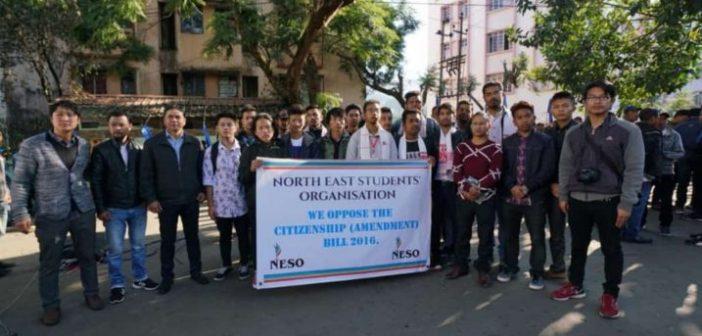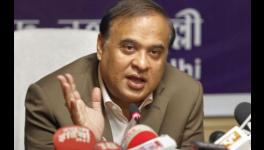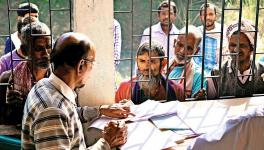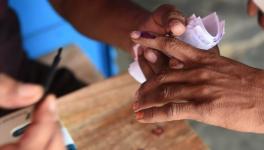Citizenship Bill Violates UN Declaration on Rights of Indigenous Peoples

Image for representational use only; Image Courtesy : The Hills Times
NEW DELHI: The Bharatiya Janata Party (BJP) government at the Centre is intent on destabilising the Northeast and undoing around a decade of progress towards peace. The Joint Parliamentary Committee (JPC) formed to study the Citizenship (Amendment) Bill, 2016, adopted a report on Thursday, January 3, without amending any part of the Bill. The Winter Session of Parliament is set to end on January 8, and there is speculation that the Bill will be tabled on Monday, a day before the last day.
Prime Minister Narendra Modi appears to have sealed his electoral fate in Assam when in a rally in Silchar, he told the gathering that the Citizenship Bill was intended to atone for the sins of the Partition. Assamese social groups expressed their displeasure and accused the Prime Minister of being on the side of the Bangladeshis. This accusation may not be entirely off the mark, as there are reports that Congress members of Parliament from Assam sought to exclude Bangladesh from the countries whose non-Muslims would be treated as ‘persecuted minorities’.
Also Read | Will the BJP forsake the Northeast to Win West Bengal in 2019?
While it is clear that the Bill violates the secular character of the Indian Constitution, a lesser known violation is that India is violating an international commitment, i.e. the United Nations Declaration on the Rights of Indigenous Peoples (UNDRIP). Article 3 confers the right to self-determination on indigenous people. This, however, in the post-colonial order, does not necessarily mean sovereign independence or, as status quoists would call it, secession. The international jurisprudence since the Canadian Supreme Court’s ruling on the secession of Quebec has transformed to mean that where internal self-determination exists, the right is deemed to have been exercised. Hence, Article 4 of the UNDRIP defines it as political autonomy.
WHO ARE INDIGENOUS PEOPLES?
Convention 169 of the International Labour Organisation (ILO) defines two categories of people under Article 1; tribal peoples and indigenous peoples. Tribal peoples are defined as “peoples in independent countries whose social, cultural and economic conditions distinguish them from other sections of the national community, and whose status is regulated wholly or partially by their own customs or traditions or by special laws or regulations”.
Indigenous peoples are defined as “peoples in independent countries who are regarded as indigenous on account of their descent from the populations which inhabited the country, or a geographical region to which the country belongs, at the time of conquest or colonisation or the establishment of present state boundaries and who, irrespective of their legal status, retain some or all of their own social, economic, cultural and political institutions.” However, self identification is the determining criteria for the Convention to apply.
Also See | Assam's LDM Protests Against Citizenship Amendment Bill at Jantar Mantar
In India, the legal status of such communities is that of a Scheduled Tribe (ST) whose scheduled status depends on whether they have been accorded protection under either Schedule V or VI of the Indian Constitution. However, considering that at present, there are 113 proposals for inclusion under either Schedule, the number of communities with ST status cannot be said to be indicative of the number of indigenous communities in India.
UNDRIP IN THE CONTEXT OF NORTHEAST
In the context of the Citizenship Bill and the opposition to it from the Northeast, Article 8 of the UNDRIP is of particular significance. Clause 1 states, “Indigenous peoples and individuals have the right not to be subjected to forced assimilation or destruction of their culture.” Clause 2 places a duty on the states to “provide effective mechanisms for prevention of, and redress for” a fairly comprehensive list of assimilative policies. Sub clause (c) seeks to prevent “any form of forced population transfer which has the aim or effect of violating or undermining any of their rights”.
Also Read | A Backdoor Push for the Citizenship Amendment Bill in Assam?
Out of the eight states in the Northeast, only four have restrictions on locals entering into or owning land. The states of Assam, Manipur, Meghalaya and Tripura apply Schedule VI of the Constitution to restrict the sale of tribal land in the specifically demarcated tribal areas. Sikkim applies the Scheduled Tribes Order as well as the Sikkim Subjects Regulation which restricts land ownership only to those persons who possess a Sikkim Subject Certificate or a Certificate of Identification. Therefore, it should appear that adequate safeguards are in place to prevent the local communities from being dispossessed of their land and control over their natural resources.
However, in an electoral democracy based on the principle of universal adult franchise, population also becomes a resource. The political resource of ‘population’ is often referred to as a ‘vote-bank’ Such vote-banks are often factored into political calculations either to divide an opponent’s resource, or to consolidate one’s own. The restrictions placed on ingress and settlement of ‘non-tribals’ in the legally defined ‘tribal areas’ does not extend to voter registration. Not that it should, but it would help explain the angst that leads to calls for extending the Inner Line System to other states, as well as the frequent Inner Line Permit frisking that some tribal youth organisations indulge in.
Also Read | Has BJP Really Won the Assam Panchayat Polls?
One could point out that the Article 8(2)(c) of the UNDRIP specifically mentions “forced population transfer”. This phrase indicates an element of unwillingness or coercion in the population transfer. The questions that arise are, which population is being transferred? And which population is being coerced? This provision does not limit the scope of its application to situations where an intention to violate indigenous rights exists, merely having the effect is enough. Hence, it is broad enough to bring within its purview both transferring a population into and out of a given area.
Regarding who faces the element of coercion, since merely the effect of undermining indigenous rights is sufficient, the coercion ought to be on the indigenous peoples in both instances. The use of force to transfer a population out of an area is something that is usually followed. However, forcefully transferring a population into an area with the aim of undermining the indigenous population does not make sense. For example, Israel is not forcing its citizens to live on encroached Palestinian land. Instead, it is the Palestinians who are coerced into accepting the Israeli settlers’ existence.
Also Read | Will Assam Burn While BJP Fiddles With the Citizenship Bill?
CITIZENSHIP BILL IN ASSAM
Assam is undoubtedly the epicentre of the present opposition to the Citizenship Bill. This is because of Clause 6 of the Assam Accord which states that, “Constitutional, legislative and administrative safeguards, as may be appropriate shall be provided to protect, preserve and promote the culture, social, linguistic identity and heritage of the Assamese people.” That migration whether documented or not has been an issue in Assam has been repeated ad nauseam. The Assam Accord was the product of a six-year long anti-foreigners’ agitation which paralysed the state from 1979 to 1985.
However, Assam’s geography is the reason that the people of the other states in the region have voiced their opposition to the Bill. Assam connects all the states in the region – apart from Sikkim – to the rest of the country. This means that every state other than Sikkim shares a border with Assam. Thus, the migrants who would become eligible for Indian citizenship if the Bill is passed would be able to move freely to all the other states in the region.
Get the latest reports & analysis with people's perspective on Protests, movements & deep analytical videos, discussions of the current affairs in your Telegram app. Subscribe to NewsClick's Telegram channel & get Real-Time updates on stories, as they get published on our website.
























